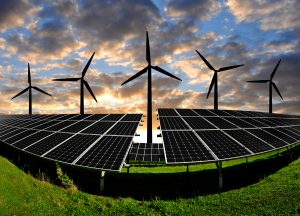Three Gorges Renewables has enjoyed an excellent debut to trading in Shanghai as the company raised $3.56 billion from its initial public offering – helping to demonstrate the potential that sustainable investing can deliver around the world.
Shares of the state-owned China Three Gorges Corp. unit rose by 44 percent in early trading, making it the largest wind-power company listed in China’s onshore market. The company intends to use the money to create seven new offshore wind farms off the coast of China, paving the way for a total capacity of around 2.5 gigawatts.
As China pursues a target of up to 35 percent renewable power on its grid by 2030, Three Gorges Renewables is expected to grow at a rapid rate. The nation needs to triple its rate of renewable power in order to hit such targets, and this greater workload may drive the profits of Three Gorges Renewables far higher – by as much as 20 percent per year, according to market analysts.
“Investors are quite enthusiastic about the prospects of the renewable energy sector, as China has been encouraging its development, in line with the country’s long-term goals,” said Stanley Chan, Emperor Securities’ research director.
As the company made clear in the financial goals of its IPO, offshore wind is a key component of Three Gorges’ business strategy – and of the Chinese renewables market overall. In 2020, Chinese energy developers installed half of the new offshore wind capacity commissioned worldwide, according to Global Wind Energy Council data.
The runaway success of Three Gorges Renewables’ floatation shows that there are great levels of interest in environmental, social, and governance (ESG) and sustainability investing all around the world. But will the trend continue to grow in the wake of the COVID-19 pandemic?
The COVID-19 pandemic has had a profound impact on sustainability investing and clean energy stocks. According to Financial Times, valuations on clean energy stocks have accelerated at a rapid pace in the wake of the pandemic. Despite valuations being largely similar across much of the second quarter of 2020, the S&P Global Clean Energy index outperformed the S&P 500 significantly going into 2021.
But what does this gulf in valuations mean? Will sustainability stocks continue to outperform their more traditional counterparts, or are we in an investment bubble that’s waiting to burst?
As more nations look to improve on their carbon footprints, sustainability has been given a greater level of purpose alongside the widespread positive sentiment behind ESG stocks. In the case of Three Gorges Renewables, we can also see that companies that prioritize the environment can also be good for generating profit, too.
The wider topic of sustainability is emerging from a somewhat niche category into one that will play a key role in the future of investment. From January through November 2020, investors in mutual funds and ETFs invested $288 billion globally into sustainable assets, representing a 96 percent increase over 2019. Prior to 2019, the quarterly estimated net flow of investment into sustainable funds had never surpassed $2 billion. However, by 2020, quarterly investments surpassed $10 billion for the first time.
Such significant inflows indicate that sustainable investing will never return to its pre-2019 levels of investment, showing that there are unlikely to be any bubble bursts around the corner for ESG funds.
It’s also worth noting that even passive investors are interested in joining in with sustainable investing. In fact, there were 534 sustainable index mutual funds and exchange-traded funds globally, accounting for $250 billion by mid-2020, according to Morningstar data.
It’s also worth considering the rise of retail investor volumes in the wake of the COVID-19 pandemic. According to Maxim Manturov, head of investment research at Freedom Finance Europe, government stimulus packages have largely been invested by citizens into new investments on the stock market.
“What we have analyzed above actually looks like the consequence of the pandemic and the stimulation packages that followed,” Manturov claimed. “This created a pool of funds retail investors could start investing into stocks. As per Fidelity report, there were 26M retail accounts in 2020, i.e. up 17% compared to 2019, while the daily trading volume doubled.”
As more people become retail investors, their sentiments surrounding the environment can help to sustain the growth of ESG stocks and help them to become an unmissable opportunity for others. According to a BCG survey of 3,000 people, 70 percent of respondents believed that they had become more aware of the impact that human activity has on the environment, whilst 40 percent intended to adopt more sustainable behavior in the future. These figures could play a key role in shaping investor attitudes.
The sheer scale of Three Gorges Renewables’ floatation in China shows that the world is not only waking up to the potential of sustainable investing, but it can be a lucrative opportunity to buy into, too.

































